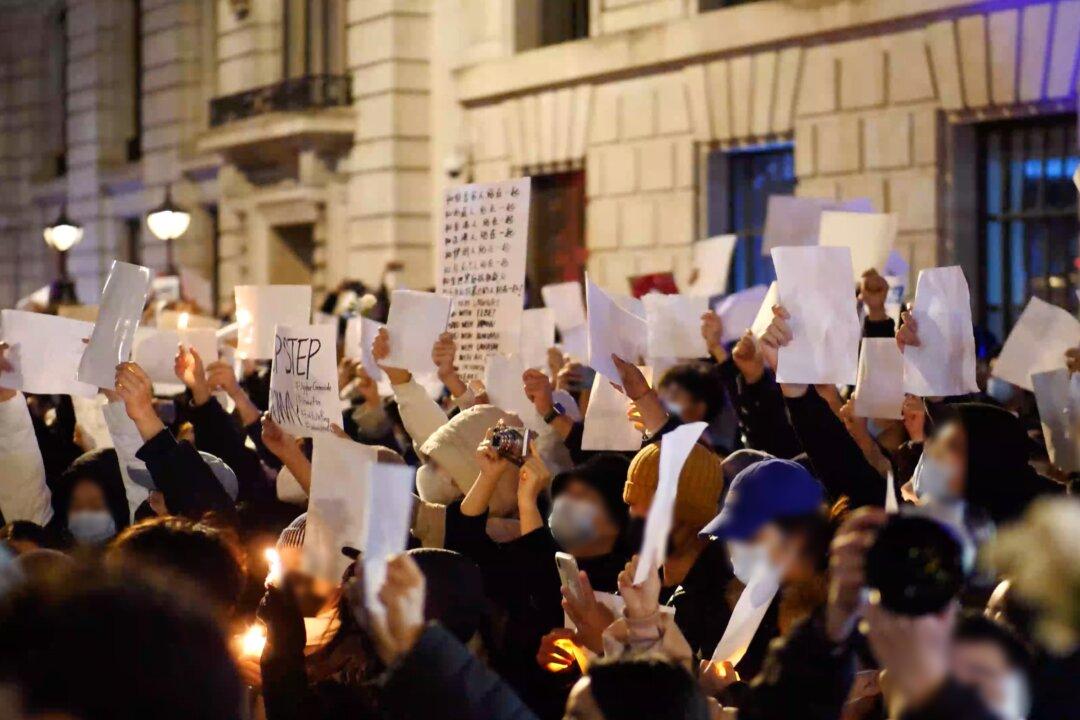Students from mainland China held vigils and rallies in a number of cities in the UK, echoing widespread protests against the regime’s zero-COVID policies that have taken place across China and around the globe.
The rare scenes of mass protests are reminiscent of the democracy movement of 1989, triggered by a fatal apartment fire in Xinjiang where victims were reportedly locked in the building under China’s extreme COVID restrictions and fire engines were said to be delayed by lockdown barriers and stranded cars in the streets.
As Chinese police started to suppress the demonstrations in China, students in the UK set up vigils in cities including London, Manchester, Edinburgh, Bristol, Glasgow, Cardiff, Leeds, Cambridge, and Belfast, to commemorate the victims of the fire in the Xinjiang capital of Wulumiqi, also called Ürümqi, and support the protesters in China.
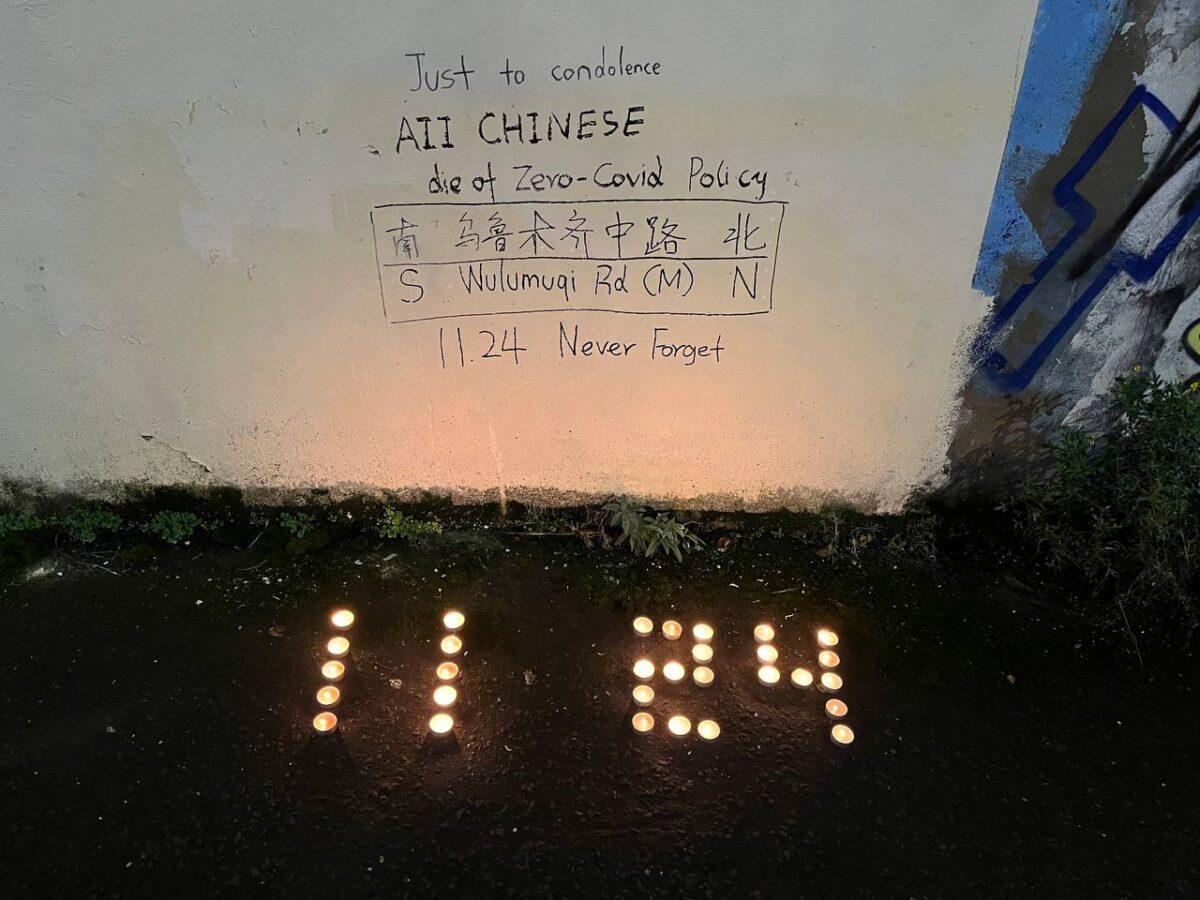
Widespread Protests
After the fatal fire in Wulumuqi, vigils and demonstrations were held in a number of cities and universities across China.According to videos and images circulated on social media, protesters at Shanghai’s middle Wulumuqi Road publicly demanded the CCP and its leader Xi Jinping to step down. Another image appeared to show officials removing road signs overnight, and police were seen arresting protesters on the following day.
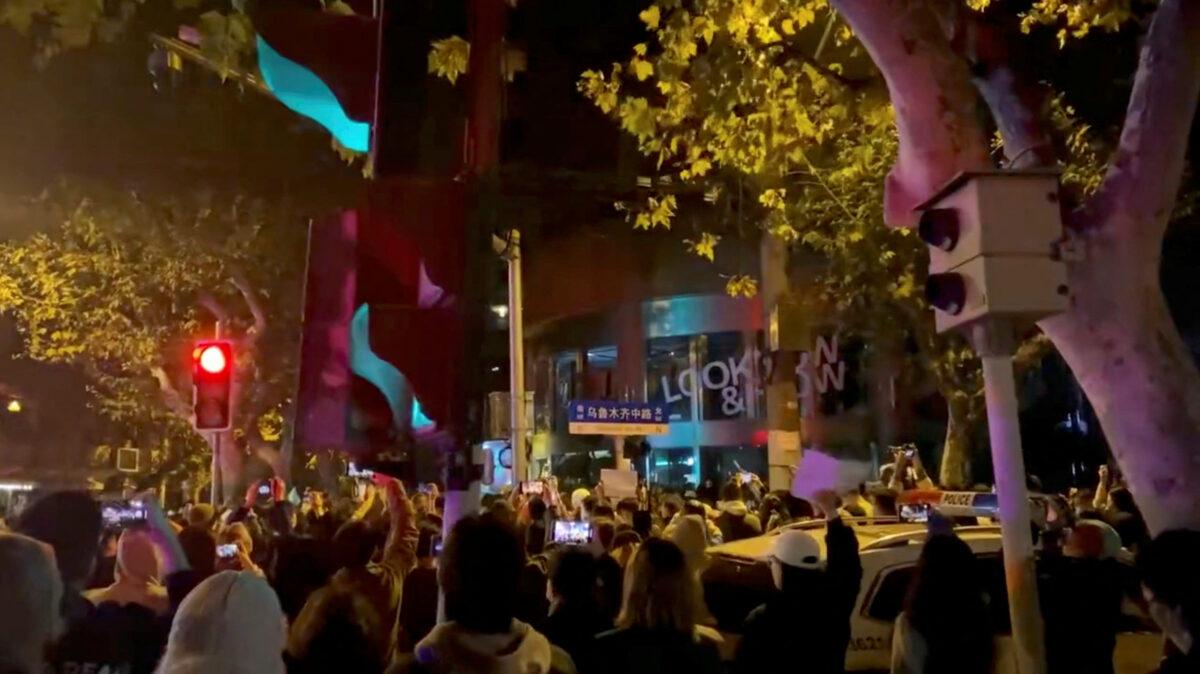
A female student at the Communication University of China, Nanjing held a piece of blank A4 paper to protest against censorship. She stayed at her spot empty-handed after the sheet was snatched away, sparking a so-called “white paper movement” around the globe. Expat students also made cutouts of the middle Wulumuqi Road sign to show support for protesters in Shanghai.
At a vigil at the University of Cambridge on Tuesday, Oxford student Lao Dao (alias) said he feels it is his duty to participate.
Lao said he loves China—the land, the people, and the food—but not necessarily the political system.
“Letting such a tragedy go unnoticed would be aiding and abetting the dictatorship. It’s also a derelict of my duty as a citizen,” he said.
A Cambridge student who did not want to be named said she had not been home for four years and is worried about her father who lives under the stringent zero-COVID policy.
Cambridge Student Ma Luo told The Epoch Times he was inspired by the bravery of the protesters in China, and wishes to pass on their demands as well as their courage.
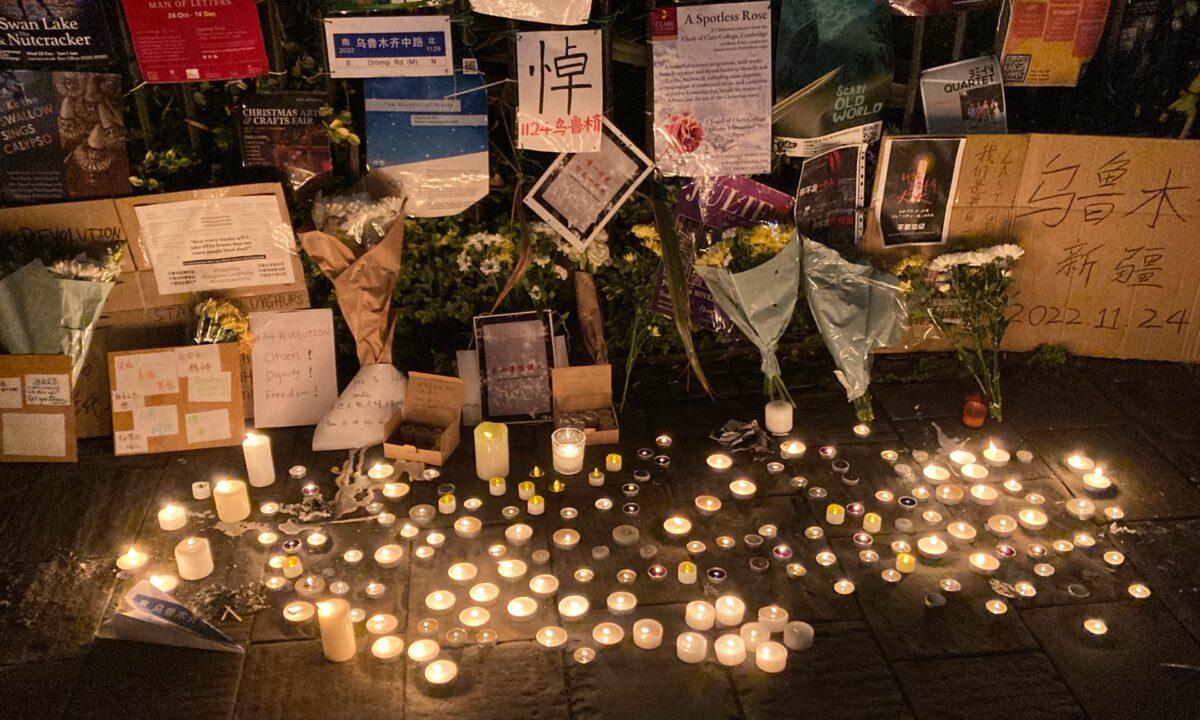
Author: White Paper Movement Represents Hope
According to different estimates, around 1,000 to 3,000 people, many of who appeared to be Chinese students, were at the rally outside the Chinese embassy in London on Sunday.Ma Jian, an award-winning Chinese author who has observed the 1989 democracy movement up close, said he has not seen so many young mainland Chinese protesters for a long time.
Unlike other protests in the past few decades, “so many Chinese students were willing to show up at the Chinese embassy—the place they had feared the most and had the tightest control on them,” he told The Epoch Times on Tuesday.
Having heard speeches and spoken to the students, Ma said there has been a lot of resentment built up during the COVID-19 pandemic, and that the students saw the difference between a democracy and an authoritarian regime with their own eyes.
Under the CCP’s so-called zero-COVID policy, “they either have been prevented from returning or leaving China, or their families may have been barred in their homes. They may have become poorer, and their parents may have lost their jobs after their workplaces went bust,” Ma said.
“One student spoke of their Muslim parents under persecution, another said their family was locked up under quarantine rules and forced to starve, others spoke of the soaring food prices,” Ma recalled, adding that some also spoke of their school friends being arrested in China for joining the protests.
Under the rule of the CCP, speaking on political opinions has become taboo in Chinese society, especially after the 1989 democracy movement.
“It’s the hallmark of authoritarian regimes, all these young students would have been told by their parents and grant parents to avoid politics,” Ma said. “But they are still willing to speak out, in many cases without the support from their families. I applaud them.”
The white sheets are “sparks of fire that represents the real emotion of the people,” he said. “It’s the heritage of fighting against authoritarianism, censorship, and totalitarianism.”
China and the World on Crossroads
Asked what the UK government should do, Ma said, “If British politicians send an unambiguous message of endorsement, telling the students their actions are in the best interest of both China and the UK, and pledge protection for those in fear of persecution, it will most certainly encourage more students to speak up.”He also warned the UK against relying on Chinese manufacturers for cheap labour and environmental considerations, saying the CCP has effectively become a modern coloniser by controlling the world’s supply chain.
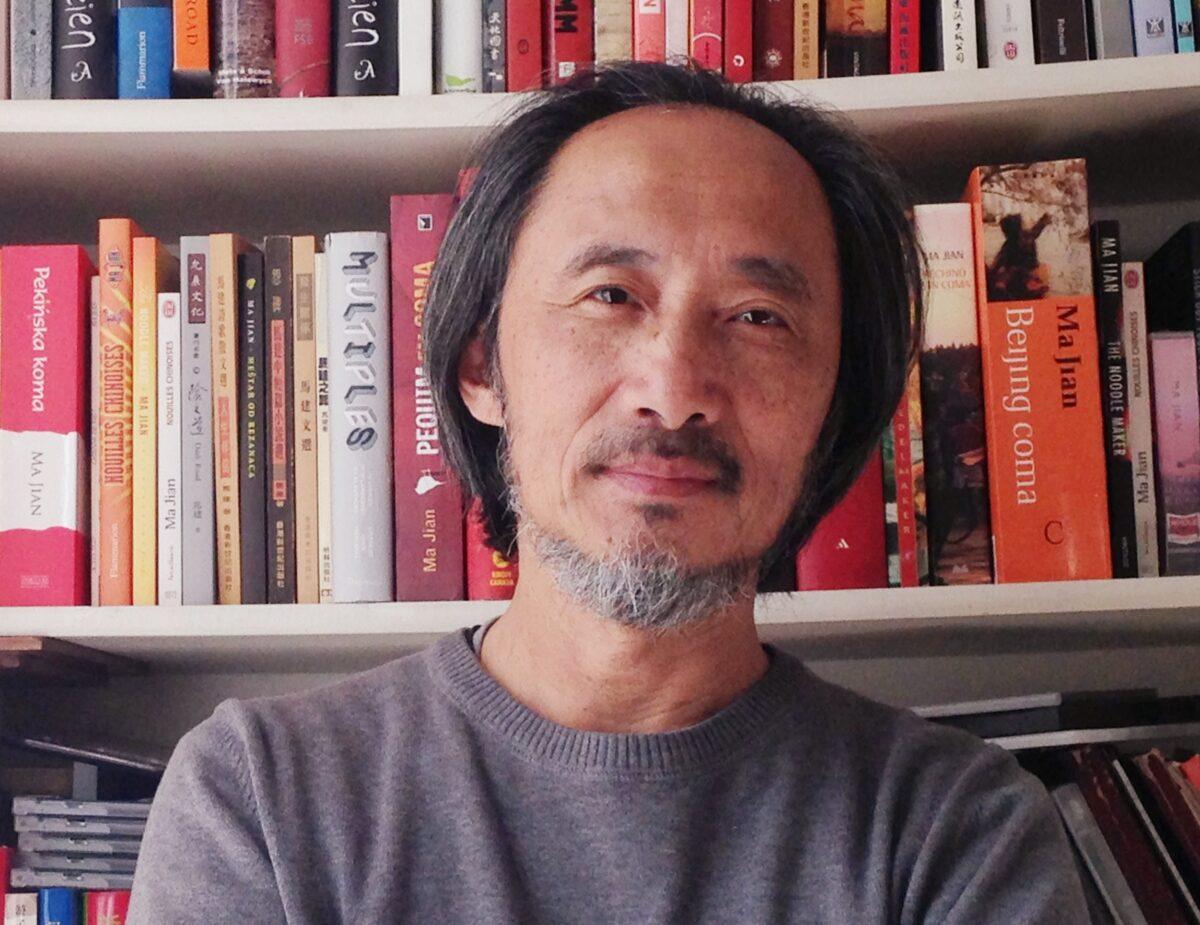
China researcher Shao Jiang, who was a Tiananmen student in 1989, also urged the UK government to be tougher on human rights issues, saying doing otherwise would eventually cost the UK’s own democracy.
Prime Minister Rishi Sunak on Monday said the so-called “golden era” of the Sino–British relationship is over, and said the UK will strengthen its resilience and economic security.
Speaking of what the recent protests mean for China’s future, Shao said there doesn’t seem to be enough protesters to tip the scale.
In the face of the CCP’s divide-and-conquer tactics, Chinese people need to be willing to risk their own interests and stand up for others before real change can be instigated, Shao argued, adding that the same principle applies to Western democracies.
Speaking of his own arrest while protesting during Xi’s state visit to the UK in October 2015, which marked the start of the so-called golden era, Ma argued that capitulating to the Chinese regime saw the erosion of human rights in the UK.
Ma was arrested for breach of peace while protesting over the Tiananmen Square massacre. Police later raided his house before dropping charges against him.
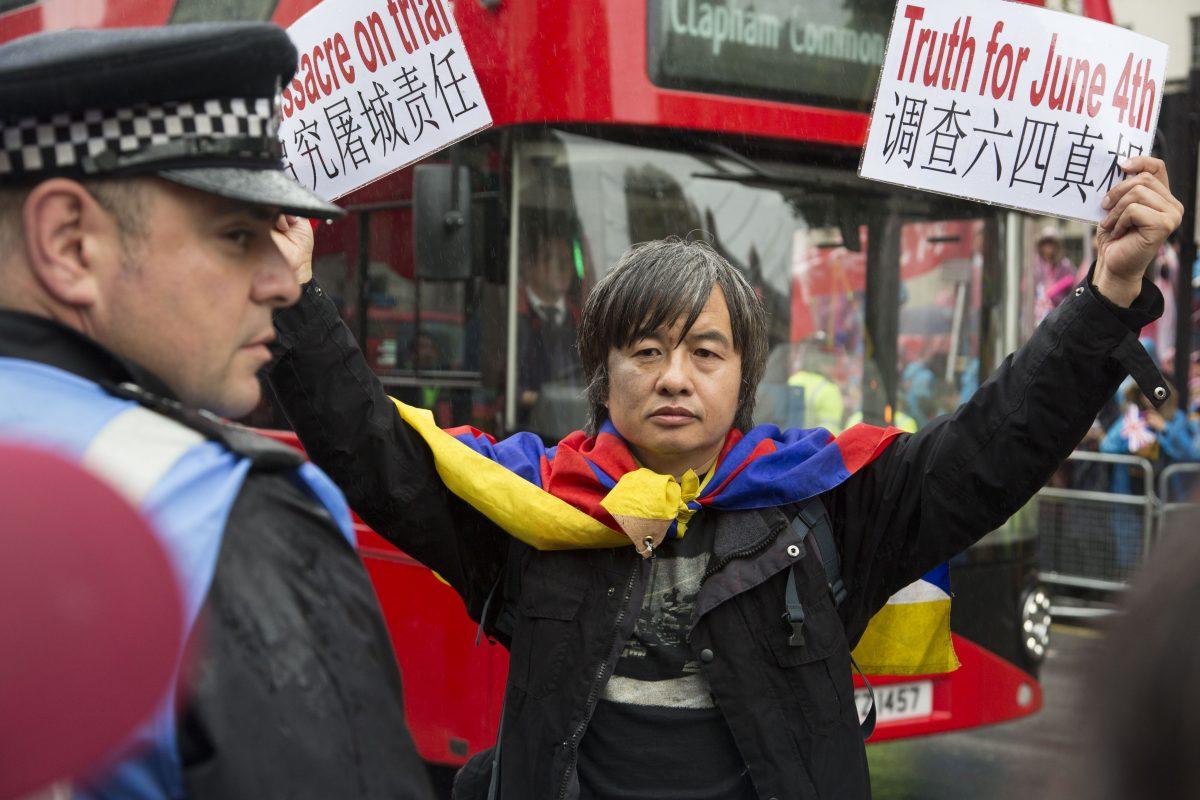
“What does it mean to end the golden era? Will the UK show more support for human rights in China such as the rights of workers at Foxconn or continue to pursue the Chinese market?” he questioned. “While making a profit in the pre-Xi China, have the British political and financial elite considered why the cost of labour was low in China?”
Referring to the unanswered question of the origin of COVID-19, Shao said he believes the West is at a “crossroads” between the erosion and strengthening of democracy.
The most significant threat the CCP poses, he argues, is neither military nor economic, but to Western freedom and democracy.
“The more important thing is whether you can protect your own democratic system, if you prize economic interests over human rights, you will corrupt your value with or without the CCP’s infiltration,” he said, arguing the UK’s new legislation targeting disruptive protests is a worrying sign of authoritarianism.
